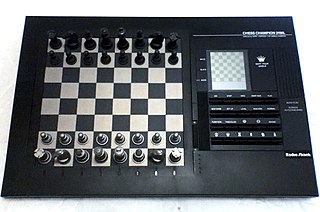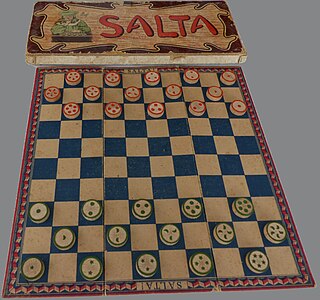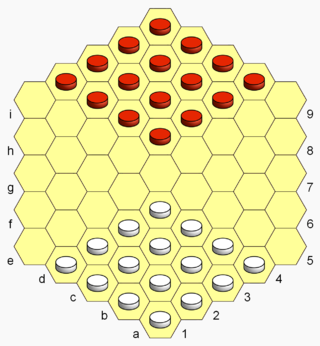
Chess is a board game for two players, called White and Black, each controlling an army of chess pieces, with the objective to checkmate the opponent's king. It is sometimes called international chess or Western chess to distinguish it from related games such as xiangqi and shogi. The recorded history of chess goes back at least to the emergence of a similar game, chaturanga, in seventh-century India. The rules of chess as they are known today emerged in Europe at the end of the 15th century, with standardization and universal acceptance by the end of the 19th century. Today, chess is one of the world's most popular games, and is played by millions of people worldwide.

Checkers, also known as draughts, is a group of strategy board games for two players which involve forward movements of uniform game pieces and mandatory captures by jumping over opponent pieces. Checkers is developed from alquerque. The term "checkers" derives from the checkered board which the game is played on, whereas "draughts" derives from the verb "to draw" or "to move".
A solved game is a game whose outcome can be correctly predicted from any position, assuming that both players play perfectly. This concept is usually applied to abstract strategy games, and especially to games with full information and no element of chance; solving such a game may use combinatorial game theory and/or computer assistance.

Computer chess includes both hardware and software capable of playing chess. Computer chess provides opportunities for players to practice even in the absence of human opponents, and also provides opportunities for analysis, entertainment and training. Computer chess applications that play at the level of a chess grandmaster or higher are available on hardware from supercomputers to smart phones. Standalone chess-playing machines are also available. Stockfish, Leela Chess Zero, GNU Chess, Fruit, and other free open source applications are available for various platforms.

An evaluation function, also known as a heuristic evaluation function or static evaluation function, is a function used by game-playing computer programs to estimate the value or goodness of a position in a game tree. Most of the time, the value is either a real number or a quantized integer, often in nths of the value of a playing piece such as a stone in go or a pawn in chess, where n may be tenths, hundredths or other convenient fraction, but sometimes, the value is an array of three values in the unit interval, representing the win, draw, and loss percentages of the position.

International draughts is a strategy board game for two players, one of the variants of draughts. The gameboard comprises 10×10 squares in alternating dark and light colours, of which only the 50 dark squares are used. Each player has 20 pieces, light for one player and dark for the other, at opposite sides of the board. In conventional diagrams, the board is displayed with the light pieces at the bottom; in this orientation, the lower-left corner square must be dark.

In computer chess, a chess engine is a computer program that analyzes chess or chess variant positions, and generates a move or list of moves that it regards as strongest.

English draughts or checkers, also called straight checkers or simply draughts, is a form of the strategy board game checkers. It is played on an 8×8 checkerboard with 12 pieces per side. The pieces move and capture diagonally forward, until they reach the opposite end of the board, when they are crowned and can thereafter move and capture both backward and forward.

In chess, an endgame tablebase, or simply tablebase, is a computerised database containing precalculated evaluations of endgame positions. Tablebases are used to analyse finished games, as well as by chess engines to evaluate positions during play. Tablebases are typically exhaustive, covering every legal arrangement of a specific selection of pieces on the board, with both White and Black to move. For each position, the tablebase records the ultimate result of the game and the number of moves required to achieve that result, both assuming perfect play. Because every legal move in a covered position results in another covered position, the tablebase acts as an oracle that always provides the optimal move.
Portable Draughts Notation (.PDN) is the standard computer-processable format for recording draughts games. This format is derived from Portable Game Notation, which is the standard chess format.
Nemesis is an English draughts program by Murray Cash. Today Nemesis is no longer commercially available; development stopped years ago.

The Fédération Mondiale du Jeu de Dames is the international body uniting national draughts federations. It was founded in 1947 by four Federations: France, the Netherlands, Belgium and Switzerland.

Armenian draughts, or Tama, is a variant of draughts played in Armenia. The rules are similar to Dama. Armenian draughts, however, allows for diagonal movement.

Salta is two-player abstract strategy board game invented by Konrad Heinrich Büttgenbach in 1899 in Germany. Büttgenbach (1870–1939) was born in Heerdt, near Düsseldorf, Germany. The game attained its highest popularity in the early 1900s before World War I especially in France and Germany. The World Trade Fair of 1900 in Paris exhibited a Salta board made of mahogany with golden counters adorned with more than 5,000 diamonds. Famous players were the US chess master Frank Marshall, the German World Chess Champion Emanuel Lasker, and the French actress Sarah Bernhardt.
Solving chess consists of finding an optimal strategy for the game of chess; that is, one by which one of the players can always force a victory, or either can force a draw. It is also related to more generally solving chess-like games such as Capablanca chess and infinite chess. In a weaker sense, solving chess may refer to proving which one of the three possible outcomes is the result of two perfect players, without necessarily revealing the optimal strategy itself.

Hexdame is a strategy board game for two players invented by Christian Freeling in 1979. The game is a literal adaptation of the game international draughts to a hexagonal gameboard.

Dameo is an abstract strategy board game for two players invented by Christian Freeling in 2000. It is a variant of the game draughts and is played on an 8×8 checkered gameboard.

Malaysian checkers or Singaporean checkers, is a variant of the board game of draughts played primarily in Malaysia and Singapore, especially among the elder men. Similar to the Canadian checkers, it is played on a 12x12 checkered board. The game can also be played on a 8x8 board if a 12x12 board is unavailable. However, it is distinct from Checkers and Canadian Checkers in terms of its additional rules. Popular alternative names used locally for this game include Dum and Dam.
Frisian draughts is a variant of draughts native to Friesland in the Netherlands. The rules are similar to International draughts, but is notable for its unique feature of allowing for orthogonal captures in addition to the familiar diagonal capture of most draughts variants.











